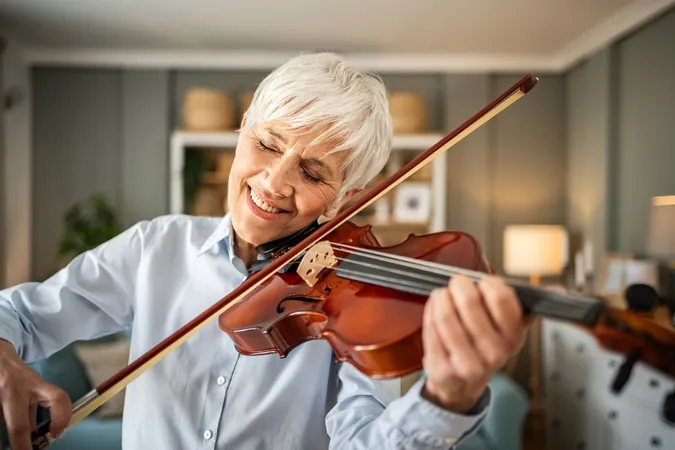
Unlocking Youth: How Music Can Reverse Brain Aging Even in Older Adults!
2025-07-15
Author: Wei Ling
Can Music Really Turn Back the Clock on Your Brain?
Recent groundbreaking studies reveal that playing a musical instrument might just be the key to healthier aging. Not only does it enhance brain function, but it could also act as a safeguard against dementia, especially for older adults.
The Power of Practice: Long-Term Musical Benefits
In a fascinating study published by scientists from Canada and China, researchers examined 50 adults averaging 65 years old. Half were seasoned musicians, having played for over three decades, while the other half were non-musicians. They even included younger participants for comparison.
Using advanced MRI technology, they measured brain activity as participants tackled challenges in noisy environments. The results? Older musicians showcased brain responses akin to those of their younger counterparts, while non-musicians demonstrated troubling signs of cognitive decline.
A Fine-Tuned Brain: Less Stress, More Clarity
Dr. Yi Du from the Chinese Academy of Sciences noted, "Just like a well-tuned instrument doesn’t need to be played louder to be heard, the brains of older musicians stay finely tuned." This incredible study suggests that musical training builds cognitive reserve, enabling brains to navigate noisy conditions more effortlessly.
The Mystery of Cognitive Reserve: A Lifeline Against Decline
As we age, cognitive functions like memory and learning typically deteriorate. However, the concept of cognitive reserve—our brain's ability to endure damage—offers hope. Dr. Morten Scheibye-Knudsen from the University of Copenhagen emphasizes the mixed messages surrounding brain training. Yet, benefits are clearer with music.
Late Starters Welcome: Music's Timeless Allure
Another study from Kyoto University followed 53 seniors, averaging 73, who took up instruments for four months. While initial changes were minimal, a follow-up four years later unveiled striking results. Those who kept playing exhibited preserved cognitive functions, while others who stopped saw declines in their brain structure.
It's Never Too Late to Play!
According to Scheibye-Knudsen, playing an instrument not only maintains cognitive health but also fortifies the brain's structure. And it’s not just about the notes—social interactions fostered by making music are crucial for mental well-being as we age. "I encourage everyone to dive into music," he said. "It’s never too late to learn and reap the rewards!"

 Brasil (PT)
Brasil (PT)
 Canada (EN)
Canada (EN)
 Chile (ES)
Chile (ES)
 Česko (CS)
Česko (CS)
 대한민국 (KO)
대한민국 (KO)
 España (ES)
España (ES)
 France (FR)
France (FR)
 Hong Kong (EN)
Hong Kong (EN)
 Italia (IT)
Italia (IT)
 日本 (JA)
日本 (JA)
 Magyarország (HU)
Magyarország (HU)
 Norge (NO)
Norge (NO)
 Polska (PL)
Polska (PL)
 Schweiz (DE)
Schweiz (DE)
 Singapore (EN)
Singapore (EN)
 Sverige (SV)
Sverige (SV)
 Suomi (FI)
Suomi (FI)
 Türkiye (TR)
Türkiye (TR)
 الإمارات العربية المتحدة (AR)
الإمارات العربية المتحدة (AR)